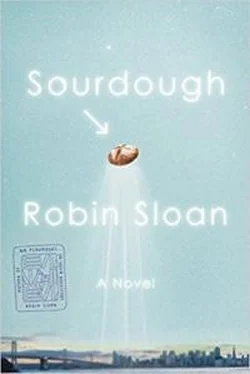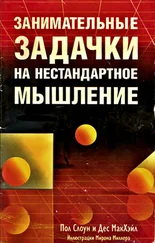In this new darkness, my team greeted me. The Faustofen woke with the whoomph of burners. The Vitruvian snapped to life with a friendly chime and leapt instantly to work, arranging its tools in a neat line. The forming of the loaves still eluded it, but I’d taught it to reach the sink and wash the mixing bowls. That was something.
In this new darkness, the Clement Street starter greeted me like a puppy, yapping and leaping, excited to be alive.
In this new darkness, a catalog of phenomena:
• Ripples across its surface like laughter
• Bursts of luminescence, like the signal flare from before, but brighter, shifting from green to pink
• A tiny pseudopod rising slowly like a periscope, wobbling back and forth, then retracting into the crock
• Songs, various: wider-ranging, not just imitations of Chaiman’s CD, but new sounds it was picking up in the depot, including a soft but unmistakable foghorn
• Scents, various: still banana, always, along with smoky smells, like far-off fires, and occasionally the scent of gasoline
In this new darkness, I baked as fast as I could: taking dough from the Vitruvian, forming loaves, slamming them into the Faustofen.
Then, while the Vitruvian stirred another batch of dough and the Clement Street starter performed its last labors in the oven, I cracked my laptop and did the work of the Dextrous, responding to emails, reviewing code. I was preternaturally productive in those hours. At first I theorized it was something about the rhythm of baking, the quick bursts of attention alternating with mandatory pauses, but then I decided it was probably something simpler: I was happy.
Most days, I gathered my loaves and rode the Omebushi back to San Francisco, still in darkness, to deliver them to Chef Kate.
On Wednesdays, I kept baking while the market opened for its preview hour. I called out, “Arm, change task. Say hello!” and the customers waved back. Loaves came out of the Faustofen and disappeared in moments. Pizzazz! As soon as I sold out, I patted the Vitruvian on the shoulder, powered it down, covered the starter in its crock, made for the Omebushi , and watched the sun rise over the Oakland hills from the middle of the bay.
My work complete, I went to work.
At lunchtime, I sat with the Slurry contingent in the General Dexterity cafeteria, but it had been weeks since I consumed any of the nutritive gel myself. I ate my own product: sourdough bread slathered with butter or soft avocado, consumed with gusto while Peter looked on ruefully.
* * *
AT BEO’S URGING, I upgraded my flour. The cheap stuff had served me well, but this new phase called for a finer grain. There was a mill just fifty miles away, in a farm town west of Davis, that sold flour ground from wheat grown nearby. It cost more than twice as much as King Arthur flour, so I started small, with just a little bag, a test run.
The Clement Street starter loved it. It groaned and luxuriated. It belched ecstatically.
There was more to upgrade. I went to a shop in downtown Oakland that sold salt of every kind and color, black and pink and blue. Each variety sat shimmering in a glass canister, priced by the ounce, with a handwritten card recounting its biography: here, salt from the beaches of Gujarat; there, salt from the pans of Brittany; behold, salt from the suburbs of Portland.
I backed slowly out the door. I would stick with Diamond Crystal.
At the Marrow Fair, I sought out Gracie, the woman with the Chernobyl honey, and the starter’s next feeding included a thin drizzle of the stuff. The morning after that, it glowed brighter than ever before, and when the loaves emerged, their expressions looked slightly wonky. I took a picture and shared my findings with Beoreg.
* * *
I WAS GETTING HEALTHY.
My arms were stronger, from working the dough. My legs were thicker, from riding my bicycle. My butt showed a heretofore unimagined definition. Even with all the bread I was eating—and it was not a small amount—I lost ten pounds. I felt lean and purposeful. Scoping myself out in my stand-up mirror, I turned and gently twerked.
In the evening—it was possibly more accurate to call it late afternoon—when I fell into my bed, I was truly tired; not merely the brain-spent Well, I guess I’ll give up now tiredness of a day at the robot factory, but something deeper, actually muscular.
Weeks passed in a haze of happy exhaustion.
In this new darkness, once every two weeks, I found waiting on the ping-pong table an envelope, and inside a check issued by the Patelco Credit Union under the authority of an ALAMEDA TEST MARKET, LLC, bearing the angular signature of Lily Belasco . My earnings, minus the market’s percentage. The amount was not staggering—barely a tenth of my General Dexterity paycheck for the same amount of time—but this money felt more truly mine, somehow.
In this new darkness, I stood behind the ping-pong table, considered the Clement Street starter in its crock and my partner the brawny Vitruvian. The hardy Faustofen, too. I looked out across the depot, awash in pink light, the tang of tube-fish rising, and realized it was the hidden root of something interesting and maybe important, and I, improbably, was part of it.
WE’RE MOVING AGAIN!
Shehrieh decided suddenly, and when you’re Mazg, you don’t question this feeling. Our destination is Berlin. It’s actually going to be perfect. Even though Berlin is a bigger city than Edinburgh, the Mazg community there is smaller. I’m thinking strategically, you see.
I just finished packing our kitchen things into boxes. I wish we could take the oven. It’s a good one—a very old and beautiful English model. I told our landlord she could sell it on the internet. Someone in California would buy it in a second, then pay just as much again to ship it across the world.
I still haven’t told anyone else about my restaurant. This is good practice, to say it, or write it. I’m nervous. Shehrieh will be worried because we’re supposed to be “the second-story people.” Leopold will be worried just because he worries. But I want those tables! I want a sign, written in German and in Mazg. I want a front door with a little bell that rings when people step inside.
I’m starting my own restaurant.
I’m starting my own restaurant!
THE EATER’S ARCHIVE
IT WAS WEDNESDAY MORNING at the Marrow Fair, the customers all gone, the doors closed again. Horace sidled up to my workstation while I was cleaning, and I could tell by his quiet calm—no incipient factoid, no swirling ecstasy of trivia—that something was afoot.
He lifted a loaf of the sourdough, held it at arm’s length, regarded it with a new sharpness.
“You cut these faces into the crust, do you? You learned the technique from someone? From a book?”
I wiped my hands on my apron. “No,” I said carefully. “I didn’t learn it from a book.”
“I suspected as much.” He lowered his voice. “I found something.”
“What kind of something?”
“What do you think?” He waggled the loaf, then tucked it under his arm like a football. “Come along.” I began to protest, but he was already on his way. “Come along! You’ll want to see this.”
* * *
HE LED ME THROUGH THE LEMON GROVE and into his library, but he did not pause in the shelves. Instead, he plunged through them, and beyond, into a portal I had never before noticed—or, if I had, I assumed it led into one of the depot’s innumerable dark corridors.
It did, but this corridor was lined with shelves. Horace’s library continued.
“Yes, of course it does,” he said. “At the time I moved here, I had two thousand linear feet of materials, and to store such a collection in archival-grade conditions … it was not cheap. Mr. Marrow was able to entice me primarily with the prospect of unlimited storage.” He said those last words with palpable relish.
Читать дальше










